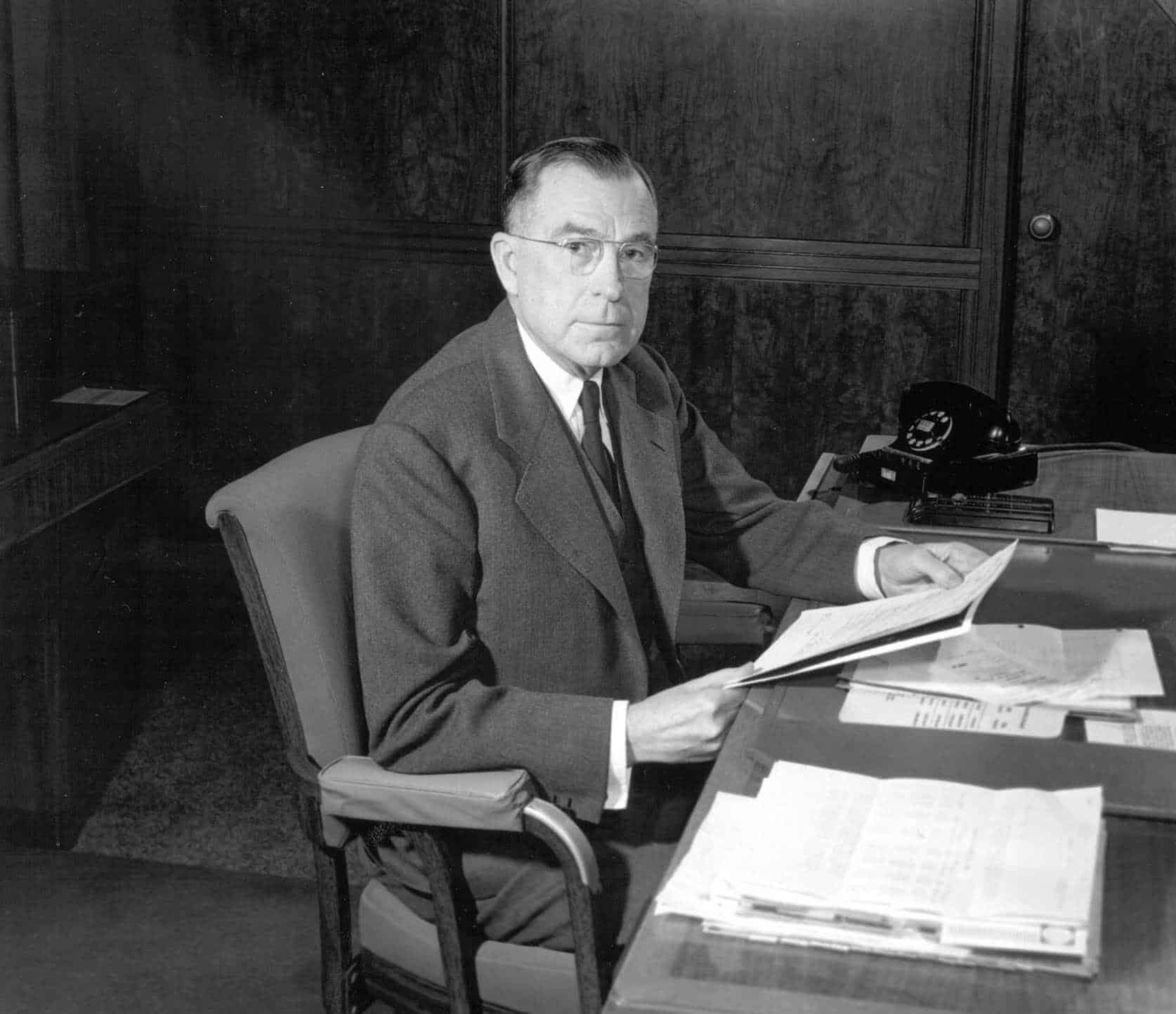You have the chance to ask Bill Gates, the billionaire founder of Microsoft, one question. What would you ask?
If you're a young man in Australia, you ask a deeply personal question:
"How have you managed to succeed in a predominantly extroverted world and how can the education system, with its increasingly extroverted ideals, harness the positive features of the introverted personality?"
This happened on an Australian show called Q&A, where Bill Gates was their special guest for an episode.
When asked that question, Gates paused for a moment, then said:
"I think introverts can do quite well.”
The audience erupted in laughter and applause.
Billionaire Founder and Introvert?
At first glance, Gates doesn't seem like your stereotypical leader. Introvert expert Susan Cain described him as quiet and bookish. These are not the traits you typically hear associated with a leader.
When you hear "leader,” what kind of person do you envision? An outgoing, charismatic leader standing in front of a crowd?
If so, you're not alone.
In a UC Berkeley study, researchers discovered that people tend to hire and promote those with extroverted personality traits (assertive, forceful, and self-assured) to leadership roles.
These individuals were more likely to speak up first, answer more questions, and have more relevant answers to questions. This caused group members to believe that they were more competent than others.
Further, an article in the Harvard Business Review revealed that the higher the position a manager has, the more likely they'll be extroverted. This chart shows the percentage of extroverted managers at each level:

Low and middle-level managers tend to be introverts. However, as you climb up the corporate ladder, extroverts become more common.
Just because extroverts are more likely to be top-level leaders, doesn't mean introverts cannot succeed, too.
That's why today, we tackle the question of how introverted leaders can be successful.
Table of contents
- What Does It Mean to Be an Introverted Leader?
- How Introverted Leadership Wins in the Workplace
- 5 Ways Introverted Leadership Can Make You a Great Manager
What Does It Mean to Be an Introverted Leader?
It’s important to dispel a common myth about introversion: being an introvert is not about being shy and quiet. Instead, it’s about how you get your energy.
Introverts are replenished by solitary time focused on ideas and their own inner world, while extroverts get energized by being with other people.
The mindset and approach of inverted leaders have a few key advantages that help them thrive including:
- An introverted leader thinks, before speaking. They are comfortable with silence and don't feel the need to constantly fill space with words, which makes them an excellent listener.
- They know how to build rapport and completely understands others' needs and motivations due to his capacity for empathy and listening.
- An introverted leader shares the spotlight, because they prefer to not be the center of attention. In doing so, they create space for others' ideas and input to shine.
An introverted leader may not be as charismatic as their counterpart, the extroverted leader, but these traits provide their own benefits and advantages.
Let’s look further at the advantages, and key skills of introverted leaders.
How Introverted Leadership Wins in the Workplace
Professors Francesca Gino, Adam M. Grant, and David A. Hofmann released a study measuring the performance between extroverted and introverted leaders.
They discovered that introverted leaders performed best when managing proactive employees.
These are people who like to actively express their ideas and work with managers to solve problems. They come to their managers to voice concerns instead of needing to be asked.

Successful leaders can be introverts or extroverts
The study surveyed 57 pizza store managers and 374 of their employees. Store managers were rated on their personality traits. Meanwhile, employees rated how open and inviting their workplace was to new ideas. The managers were then monitored for overall performance based on revenue for their store.
Researchers concluded that extroverted and introverted leadership works best in different work environments. Stores with more passive employees benefited from extroverted leadership - showing 16% higher profits than average. Yet, when they managed proactive employees, they had 14% lower profits than average.
This graph shows that introverted managers performed best when leading proactive teams:

Their findings show that depending on your team makeup, a more introverted or more extroverted leader will thrive.
Meanwhile, back at Sir John Clancy Auditorium with Q&A, Bill Gates shared similar beliefs in his answer on how introverts can succeed:
"If you're clever you can learn to get the benefits of being an introvert…
[Like] being willing to go off for a few days and think about a tough problem, read everything you can, push yourself very hard to think out on the edge of that area, and then you come up with something...
If you want to hire people, get them excited, build a company around that idea. You better learn what extroverts do, you better hire some extroverts...like Steve Ballmer I would claim as an extrovert, and tap into both sets of skills in order to have a company that thrives both as in deep thinking and building teams and going out into the world to sell those ideas.”
If you're an introvert, you have just as many unique and valuable qualities that can be very helpful to leading a team as an extrovert. As Gates suggests, you can solve problems in solitude that an extrovert could struggle with. So leadership for introverts isn't that unrealistic.
However, don't rest on your introverted laurels. To ensure you can continue rising in your organization (assuming that's your goal), it's best to improve your weaknesses and understand what your strengths really are.
Society has framed introversion often as a weakness, but it really can be your competitive advantage.
Now, let's dig into ways you can use your introverted personality to be a great manager.
5 Ways Introverted Leadership Can Make You a Great Manager
It may sometimes feel like leadership is only for extroverts, but it doesn't have to be that way. Lucky for you, we've found the research that shows how you can succeed as a leader, too.
Much like the different pizza store teams succeeded with different approaches depending on the leader's introversion or extroversion, these tactics are unique to you being an introvert.

1) Don't overthink it
The most significant barrier holding you back could be yourself. In a study by Australian researchers, they wondered why more introverts didn't become leaders.
They asked 184 business students to rate themselves on how extroverted or introverted they were. Then, they expressed their feelings about an upcoming group exercise.
Most of the introverts had a negative outlook. They predicted that they would feel upset or nervous if appointed leader. They believed that they would fail if they spoke in front of people.
These introverts assumed defeat before the exercise even started, while their extroverted colleagues felt excited to lead a group.
Continuing the study, the students spent 20 minutes working on a group activity created by NASA.
When it was done, researchers realized that the introverted students overestimated their fears. Leading a group wasn't so bad.
Embrace a positive mindset
It turns out, that merely believing you'll succeed is enough to change an introvert's results. One of the researchers, Peter O'Connor, wrote in qz that introverts excited to participate were as likely as extroverts to become leaders:
"Our study found that introverts and extroverts who forecast similar low levels of negative emotions in leadership situations were equally likely to emerge as leaders.
Other research also indicates that introverts are very capable of both engaging in ‘extraverted' behavior and enjoying such behavior when compelled to do so.”
Don't let your mindset get in the way of your ability to succeed. Extroverted and introverted leadership styles can both succeed.
If you believe in yourself and develop a management style that works best for you, you can be as successful as any extroverted leader.

2) Embrace your introverted personality's strengths
Campbell's Soup is one of the most popular food brands in the world. But in 2001, the company was in deep trouble. Gallup reported that it had the worst employee engagement scores of any Fortune 500 company that they've ever seen.
About 62% of their managers weren't engaged at work, and 12% were disengaged. Also, 119 of their workgroups were in the bottom quartile of the Gallup's employee engagement database.
This toxic workplace produced low-quality products that caused their sales and stock to drop.
To combat this crisis, Douglas Conant was appointed as their new CEO. However, he wasn't your typical leader. He didn't feel natural when confronting people, or talking to large groups.

In an article in the Harvard Business Review, he wrote how his personality could sometimes confuse employees:
"As an introvert, I enjoy being by myself… But as a CEO of a company with more than 18,000 employees, I've found myself particularly challenged because so much of my work requires me to be ‘out there' in front of others.
In meetings, introverts can often be perceived as aloof, disinterested, shy or retiring…When viewed from the outside, it may seem that I'm not openly contributing as much as I could or should, but that's just because I'm busy listening and thinking.
One of the best ways I've found to help people overcome their discomfort around my behavior is to simply declare myself. I tell them, ‘If you see me looking aloof, please understand that I'm shy, and I need you to call me out.' By declaring myself in this way, I've found other people quickly, and compassionately, adapt to my style.”
Instead of trying to copy his extroverted colleagues, Conant practiced introverted leadership. He led with a style that fit who he was.
In addition, Conant credited civility for improving Campbell's culture. He made it his mission to acknowledge his employees' efforts and respect their time.
Conant enforced this mission by replacing 300 of his top managers with high performers from within the company. He wanted to make sure that his leaders were interested in listening and treating the employees better.
As a final touch, he started giving praise through thank-you notes to express appreciation to his workers. In fact, at the end of his tenure, he wrote 30,000 notes; one to every staff member, from maintenance people to senior executives.
Conant's approaches proved to be just what Campbell's needed. The results speak for themselves:
- During the 2008 recession, Campbell's net earnings per share rose 7%
- Earnings increased by 4% a year
- The total return of stock was more than 30%
- They outperformed both the S&P Food Groups and the S&P 500
- Campbell's rose from Gallup's 25th engagement percentile to 82nd
- 68% of employees were engaged and 3% disengaged, improving from their dismal 38% engaged and 12% actively disengaged number when he started.

But the most important reward for Conant was the gift he received after a car accident. While in the hospital, employees from around the world sent him get-well notes. His heart was full as his wife read the letters out loud.
Develop your unique introverted leadership style
Conant's efforts and successes show that effective introverted leadership can be very successful. Instead of criticizing yourself over not being an extrovert, or trying to force yourself to be someone you're not, embrace who you are.
Stereotypes of what a leader should be may make you question if an introverted style can work. But in reality, it can be very comforting to others, as Conant was. Build up your self-awareness and be mindful of how you positively come off to others.
By embracing who you are uniquely as a leader, you'll develop a management style that works best for you and your employees.
3) Build proactive teams
If you want to succeed with your introverted leadership style, you must be aware of factors that work to your advantage.
Contrary to popular belief, there are many benefits to being an introvert — benefits that can make you a great introvert manager. We tackled some previously with the pizza shop employees and managers.
In an article in the Wall Street Journal, Reporter Elizabeth Bernstein showed that introverts have beneficial skills that their more outgoing counterparts don't usually have.
For example, introverts are more likely to be critical thinkers and detail-oriented. They also tend to be more focused on the growth of others.

Professor Francesca Gino agreed with these ideas in her HBR article. In her work, she has seen that many extroverted managers felt threatened when employees proposed new ideas or challenged their viewpoints.
Leaning on an introvert's strength: Listening
Gino found in her research that extroverts would more often ignore their teams' suggestions, which discouraged them from contributing in the future. Meanwhile, introverts were more accepting of this type of input from their teams.
This was highlighted in Gino's T-Shirt experiment. After the pizza experiment, Gino and her fellow professors traveled to a university.
They recruited 163 college students and divided them into 56 groups, each with a designated team leader.
Next, the researchers gave half of the team leaders quotes and studies promoting extroverted leaders like JFK and MLK, Jr. Meanwhile, the other half received quotes and studies about introverted leaders like Gandhi and Abraham Lincoln.
They also then planted in each group two fake followers who asked leaders if they could try a Japanese method, which would help them win the supposed contest by folding shirts faster (which would lead to a prize of iPod Nanos).

When the contest finished, the conclusions were similar to Gino's pizza experiment.
The introverted leaders excelled when managing proactive groups and were more accepting of the Japanese folding method, increasing their productivity by 28%. These leaders made their group members feel motivated and valued.
Unfortunately, many of the extroverted leaders felt threatened when given suggestions and only succeed when their team was passive. They did not tend to take advantage of the Japanese folding method.

Hire more proactive people.
Proactive people are an asset to introverted leadership. It means that your team will benefit the most from constructive discontent. They'll share ideas and look to collaborate with you.
To these employees, conflicts and mistakes aren't seen as negatives; they're instead seen as opportunities for growth.
This leads to more innovation and problem solving at a faster rate than compared to passive teams; with confidence voicing ideas and opinions, problems are identified more easily, and the best solutions are more likely to be voiced.
Knowing what kind of people can thrive working for you means you should take this into account when forming teams and hiring your staff. Look for signs candidates and future team members are proactive by asking about how they tend to contribute to projects and stories of past work with others.

4) Give your team the freedom to innovate
Another example of introverted leadership is William L. McKnight. He's the bookkeeper turned former president and chairman of 3M.
McKnight was a quiet, soft-spoken and level-headed man. He was also passionate about two things: product and people.
In the 1920s, 3M was in constant feast or famine mode. Although they had over $1 million in annual sales (equivalent to $13 million today), the competition was high.
To stay alive, McKnight knew 3M had to continually produce new and amazing products. To do this, he practiced strong introverted leadership by promoting proactive behaviors on his teams.
Like Conant, McKnight was an introvert at heart. He rebelled against the norm of extroverted control and argued to give his employees the freedom to create. He famously said:
"Hire good people and leave them alone.”
Creating skin in the game for this belief, he helped fund the Central Research Laboratory. Here, chemists, physicists, and biologist worked together to develop materials like sandpaper and cohesive tape.
He then created the 15% rule. He knew his employees would have great ideas that could be their next great product. So, he allowed workers to dedicate 15% of their hours working on passion projects. This is a rule still practiced today at 3M and many other innovative companies.
Freedom to innovate, and make mistakes.
McKnight believed that a managers' duty was to give their employees enough room to make mistakes and innovate:
"As our business grows, it becomes increasingly necessary to delegate responsibility and to encourage men and women to exercise their initiative. This requires considerable tolerance. Those men and women, to whom we delegate authority and responsibility, if they are good people, are going to want to do their jobs in their own way.
Mistakes will be made. But if a person is essentially right, the mistakes he or she makes are not as serious in the long run as the mistakes management will make if it undertakes to tell those in authority exactly how they must do their jobs.
Management that is destructively critical when mistakes are made kills initiative. And it's essential that we have many people with initiative if we are to continue to grow.”
And, he was right. He mentored and invested in his employee's growth because he knew that 3M would benefit greatly.
For example, he hired Derek Drew. An inventor and a founder of 3M's Products Fabrication Laboratory, or Pro-Fab Lab. There, Drew and his team invented popular products like surgical tape, foam tape, decorative ribbon, face masks, and post-it notes.
McKnight fostered an environment that provided enough psychological safety for his team to stay competitive for over a century and grew sales from a few million to more than $22 billion today.
Create a proactive workplace.
To be a successful introverted leader, play to your strengths by promoting a proactive workplace.
You can do this by providing your team with psychological safety; like McKnight, you must make it safe for people to voice their ideas and make some mistakes.
In this environment, your employees build confidence to tackle complex projects and propose ideas that will solve complicated problems. Also, instead of feeling pressure to lead like an extrovert in front and be highly directive, this approach allows you to take a back seat to their great work.

5) Leverage your listening skills
Another strength of introverts is how you make others feel more at ease. This is because introverts tend to listen more than they talk.
A calm, attentive presence causes other people to feel comfortable and open up to you in ways that happen less often for talkative extroverts.
This is how Elynn Lee felt when she met Bill Gates at the University of Texas.
She gave him a tour around the Bill and Melinda Gates Computer Science Complex. After her experience, she wrote on Quora how Gates made her feel:
"He introduced himself so casually - it was if he was any person other than, [a co-founder] of the largest, most pervasive technology companies in the entire world. But, in that moment, it was as if I was just talking to another (important) adult.
Through all of the talking, Mr. Gates nodded intently and was genuinely interested in what I was saying...
There was a tightness in my chest that released... I will remember that feeling of relief and happiness for as long as I live.
Despite how nervous I was before meeting Mr. Gates, once we started to talk, everything seemed to disappear.”

Great listeners earn more trust
Gate's presence made Lee feel comfortable enough to let her guard down and be more confident in her work.
This is powerful because most people work in unpredictable industries and organizations. This means they often deal with moments of insecurity.
As an introverted leader, being a great listener and giving them opportunities to express themselves comfortably causes them to trust you more.
When your employees trust you, they're more likely to follow your instructions, come to you with problems, suggest good ideas, and be loyal to you.
You can learn how to lead as an introvert and further develop your introverted leadership strength of listening in this previous Lighthouse post here.
Conclusion
Can an introvert be a leader? Absolutely, introverted leadership is beneficial to most teams and businesses. Unfortunately, the reputation is that only extroverts can thrive as leaders. We hope today you saw how untrue that is both in the lab and for many of the most prominent leaders of today.
Most introverts believe that their personality makes them less likely to succeed as leaders. In reality, it's their quiet traits that can help them to become amazing senior leaders and mentors.
Confident and open-minded introverts can create cultures where compassion and innovation are the norm.
They work best with proactive employees who take the initiative and want to express themselves in their projects.
And their quiet demeanor and good listening skills cause people to feel more comfortable, confident, and trusting.
All of these are beneficial traits to successful teams and companies. If you're an introvert, recognize you can be a great leader, too.





